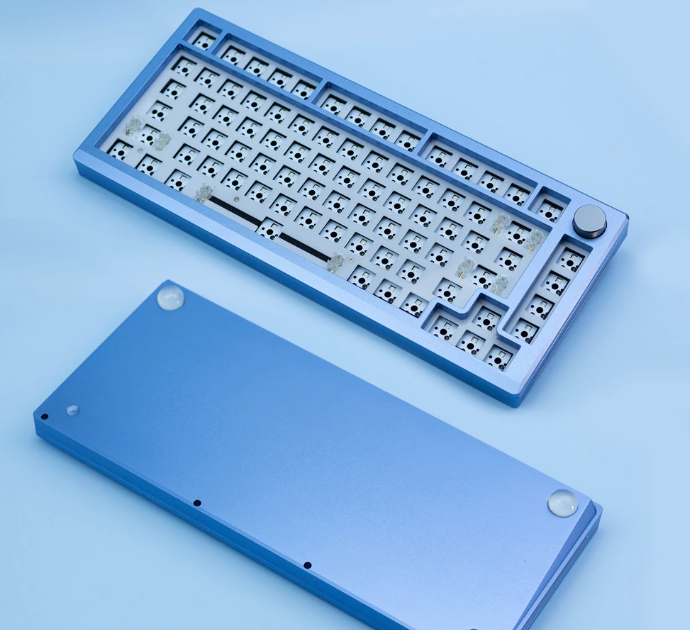The metallic feel of a mechanical keyboard and the sound of its mechanical devices are a joy for keyboard users. Therefore, the design customization of the keyboard shell is particularly important. The aluminum alloy keyboard case we often say is a customized case that is CNC processed on the alloy, and generally has a keycap. The development trend of aluminum alloy has long been one of the most important metal materials for electronic equipment, and the ability of the aluminum alloy to be recognized now is the reason for its characteristics.

Why Is Aluminum Alloy CNC Preferred for the Processing and Customization of Keyboard Shells?
Aluminum alloy is a popular material for CNC (computer numerical control) processing and customization of keyboard shells for several reasons:
-Durability: Aluminum is a lightweight but strong metal that can withstand wear and tear. It is also resistant to corrosion, which ensures the longevity of the keyboard shell.
-Customization: Aluminum alloy is easily customizable and can be machined into various shapes and designs. CNC technology allows for precise cutting and drilling, resulting in high-quality and accurate finished products.
-Aesthetics: Aluminum alloy has a sleek and modern appearance that is often preferred by consumers. It can be anodized or powder-coated to add color and protect against scratches and other damages.
-Heat dissipation: Aluminum is an excellent conductor of heat, which can help dissipate heat generated by the keyboard components, keeping them cool and extending their lifespan.
-Lightweight: Despite its durability, aluminum is a lightweight material, which makes it easy to transport and handle.
Overall, aluminum alloy is a popular choice for keyboard shell customization due to its durability, customizability, aesthetics, heat dissipation properties, and lightweight design.
How To Process the Aluminum Alloy Keyboard Shell?
The process of creating an aluminum alloy keyboard shell involves several steps, including:
-Design: First, a design is created for the keyboard shell using computer-aided design (CAD) software. This design is used to create a 3D model of the keyboard shell, which is used to guide the machining process.
-CNC machining: Once the design is finalized, the aluminum alloy material is placed into a CNC machine, which uses computer programming to precisely cut and shape the material into the desired shape of the keyboard shell. The CNC machine can be programmed to make intricate cuts and designs in the aluminum alloy, resulting in a high-quality finished product.
-Finishing: After the aluminum alloy has been machined into the desired shape, it is typically subjected to various finishing processes. This may include sandblasting, polishing, anodizing, or powder coating. These processes are used to improve the appearance and durability of the aluminum alloy keyboard shell.
-Assembly: Once the aluminum alloy shell has been machined and finished, it can be assembled into a complete keyboard. This may involve installing key switches, a printed circuit board, and other necessary components.
Overall, the process of creating an aluminum alloy keyboard shell involves precise CNC machining, finishing processes, and assembly. The result is a high-quality keyboard shell that is durable, customizable, and aesthetically pleasing.
How To Maintain the Aluminum Alloy Keyboard Case?
To maintain the appearance and function of an aluminum alloy keyboard case, consider the following tips:
-Regular cleaning: Dust and dirt can accumulate on the surface of the keyboard case over time. To clean it, wipe it down regularly with a soft, damp cloth. Avoid using harsh chemicals or abrasive materials, as these can scratch or damage the surface of the aluminum alloy.
-Avoid moisture: Aluminum alloy is prone to corrosion and rust, especially in humid environments. To prevent this, avoid exposing the keyboard case to moisture or water. If it does get wet, dry it immediately with a soft cloth.
-Handle with care: Although aluminum alloy is durable, it can still dent or scratch if dropped or mishandled. Be gentle when handling the keyboard case, and avoid placing heavy objects on it.
-Avoid extreme temperatures: Aluminum alloy can expand or contract in extreme temperatures, which can cause it to warp or bend. Avoid exposing the keyboard case to direct sunlight or extreme temperatures, and store it in a cool, dry place.
-Use protective covers: If you transport your keyboard frequently, consider using a protective cover or carrying case to prevent scratches and damage.